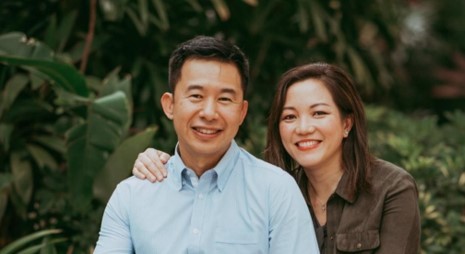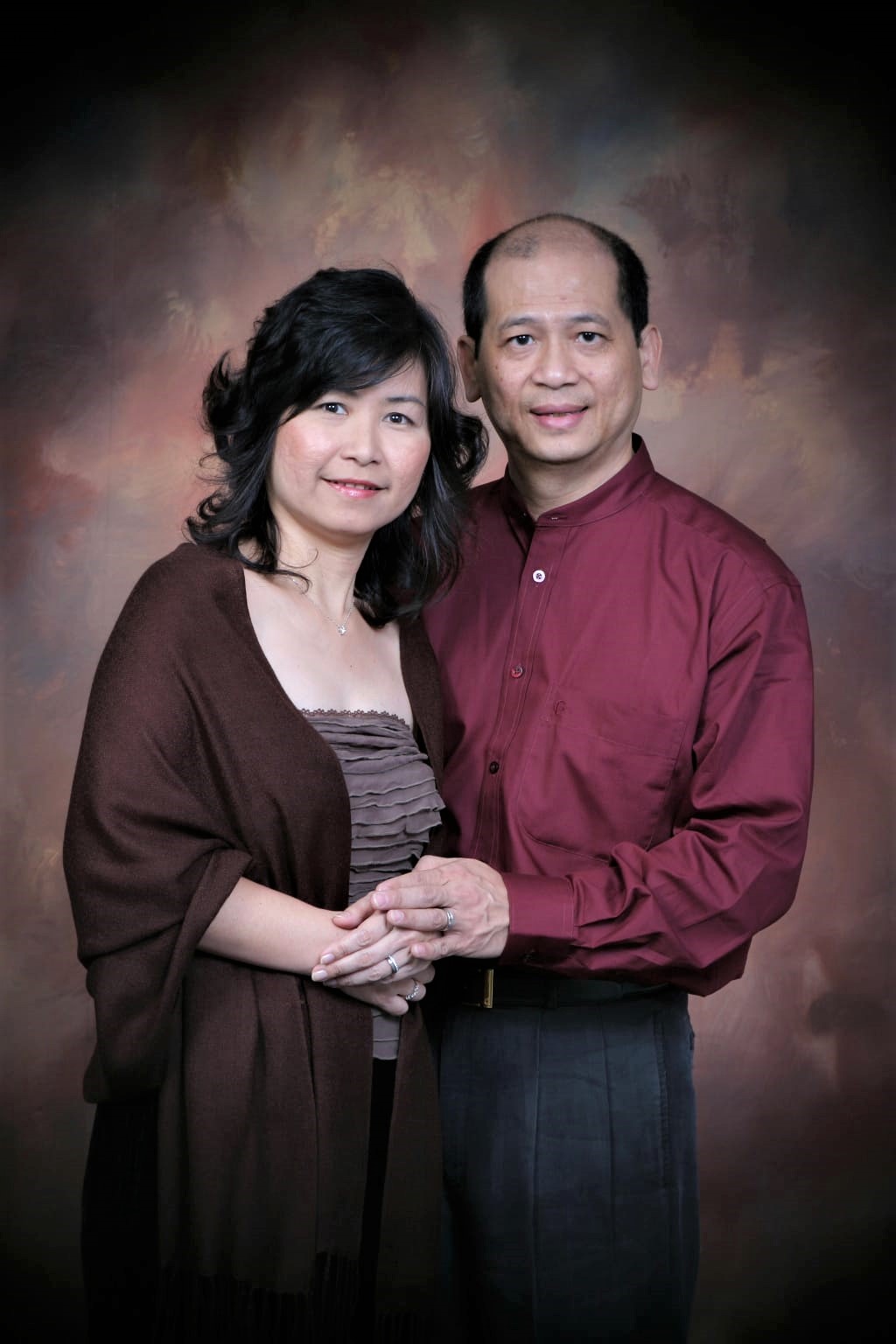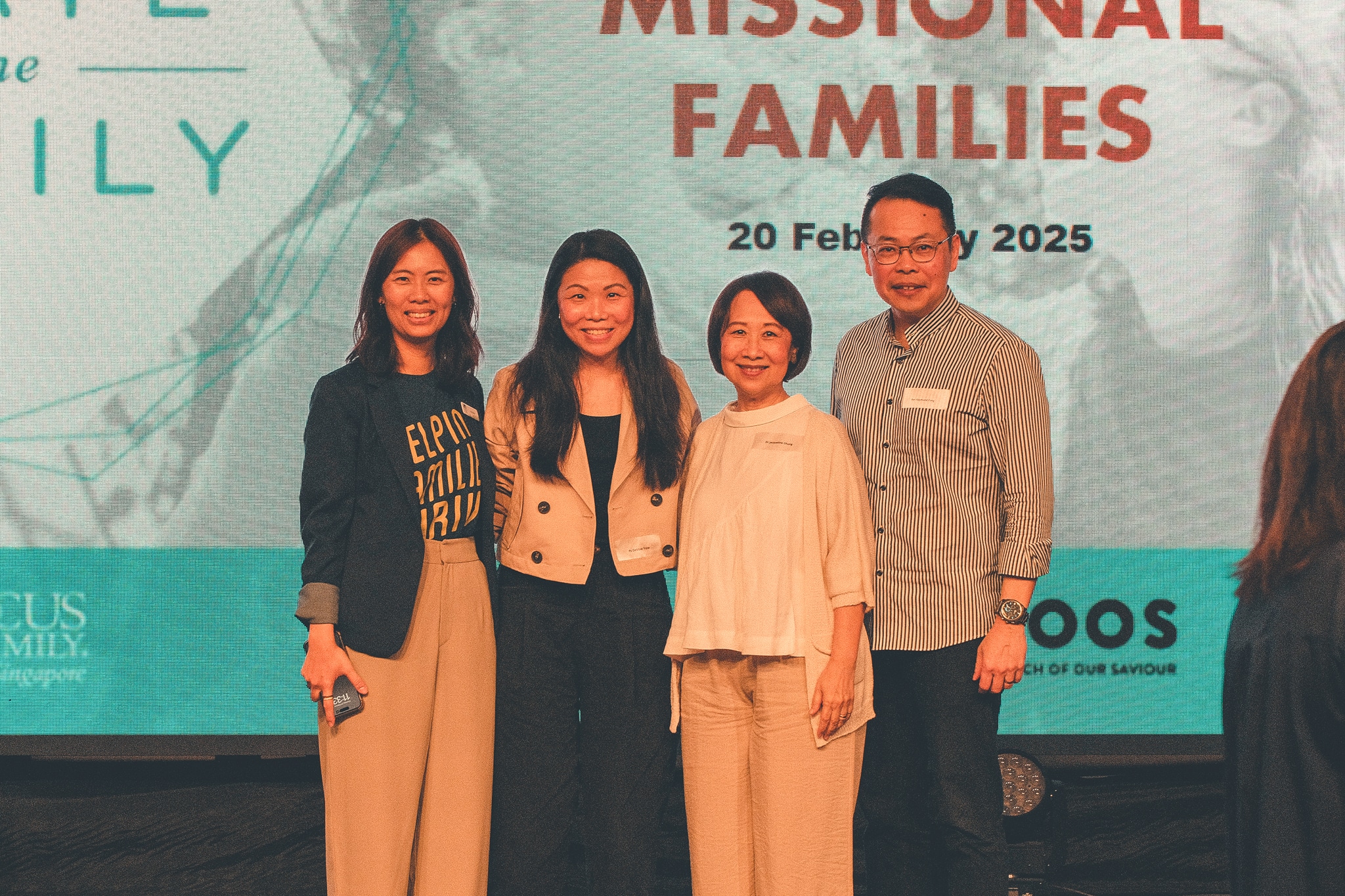“Money was never enough … but life was still meaningful and rich”: Couples share how they manage money in little and in plenty
by Christine Leow // December 5, 2021, 12:21 pm

Gary and Joanna Koh shared their experiences managing money as a couple at the recent N5 conference that sought to help believers handle finances with a Kingdom perspective. Photo courtesy of the Kohs.
When Gary Koh was dating his future wife, Joanna, her father asked him about his financial prospects.
“Every father has expectations for their daughters, that their husbands would be able to provide.”
Instead of sharing about his financial progression, Gary “talked about church work and how God will provide”.
His future father-in-law later expressed concerns.
“I cried when I heard that.”
Gary shared this bit of heartfelt personal history when he talked about how he and his wife manage their finances as a Christian couple.
They were part of the panel for the session Straight Talk on Money and Marriage. at the first-ever N5 conference (October 29-30). The conference, inspired by Nehemiah 5, was organised to equip believers to steward their finances according to Biblical principles and kingdom purposes.
Gary and Joanna have now been married nearly 22 years and, amongst other things, run marriage preparation courses for couples. Gary is a family counsellor while Joanna is the CEO of Focus on the Family Singapore. They have a teenaged son.
Also on the panel were Benjamin and Kathleen Chan. Benjamin is the Executive Director of Empower Ageing Limited, a charity which focuses on enabling older people to live fulfilling and optimised lives. Both Benjamin and Kathleen are ministry leaders at Fairfield Methodist Church and Benjamin, or “Grandpa Ben” as he is fondly known, is active in Singapore’s National Father Movement.

Kathleen and Benjamin Chan have raised four children together and, as the former Executive Director of Eagles Mediation & Counselling Centre, Benjamin has seen many couples through challenging marital relationships. Photo courtesy of the Chans.
The couple has been married for nearly 36 years. They have four children and three grandchildren, and are guardians to three orphans.
Money can be a major stressor in any marriage, agree the couples.
According to Joanna, couples interviewed by Focus on the Family Singapore revealed that money is one of the top three sources of conflict in marriages.
To help couples handle money God’s way, the couples shared five principles from their personal experiences.
#1: Trust God; He provides and protects
When Kathleen and Benjamin started their married life, money was never enough. Then, Benjamin left his engineering job to work in social services, and there was even less.
“While we never fought over money, we have pulled our hair out over the lack of money,” said Kathleen.
During one occasion when she “couldn’t see the light at the end of the tunnel” and was praying and asking God for His provision, God led her to Habakkuk 3:17-19.
“In all our struggles with our finances, we found a greater treasure. We learnt to really cry in prayer.”
“I thought there would be a promise of abundance. Instead, it talked about what happens when the fig tree does not blossom and there is no yield.
“After I got the verse, I cried even more because it was like, ‘God, I was coming to You for a hope and a future and You give me this verse?’
“But the latter verse talks about how if you will just open your heart to Me in praise, you will go on to high places where it is precarious but you will be able to stand.
“That was when I felt that I had to let go. And I found that when I let go, God came through.”
Kathleen explained that, though her situation did not always change, there was “such hope coming into my life”.
“In the spiritual, in the deep within, something shifted. In all our struggles with our finances, we found a greater treasure. We learnt to really cry in prayer.
“For my husband, God sent different people along the way to pray together and journey together.”
Despite seasons of financial hardship, this has led Kathleen to declare: “It has been quite glorious, meaningful and rich. My soul has prospered.”
Benjamin added that, in all the years when they lived on less because he obeyed God’s call to give up the corporate life, God never allowed his children to be short-changed.
Though they had to exchange expensive holidays for drives to Malaysia, his children, now all grown up, assured him that they treasured those times in the car. Even having to share a room with their siblings was viewed as a bonus because it gave them a chance to “have greater bonding”.
“They told me, ‘You have not disadvantaged us by leaving work and following God.’ God provided for every need.
“You just need to understand that wants are not what God will be handling. God wants to meet our needs instead.”
Joanna agreed, sharing how God provided for her family when they were in need.
“You just need to understand that wants are not what God will be handling. God wants to meet our needs instead.”
“Those were times when we prayed and – like what you read about in the books – you get a cheque in the mail and, wow, it happens to be exactly what we needed.
“Today, we no longer have such things because we have enough to cover the basics. But when we didn’t have enough to cover the basics, we experienced those miracles.
“It was exciting, even while it was challenging.”
For the Kohs, trusting God for their finances has also meant listening to Him when He calls them to give.
Said Joanna: “You think, ‘But we just saved this much and now you want us to give?’ But trusting is also about learning how to be generous, how not to hold on to money because these are earthly treasures.
“Whether we have much or little, we still have to live by faith.”
In Benjamin’s experience, God has not just provided, He has also protected their family finances.
His four children have never stayed overnight in the hospital before, saving on medical expenses.
“You may have a lot money but where does it go? God will provide and He will protect.”
#2: Don’t let money hold you ransom
The Kohs said they chose to “live within our means” as a way of not letting money be the centre of their lives.
“When God says, ‘Take up the cross and lay down your life’, it means lay down even your comforts and luxuries.”
Said Joanna: “We made a decision as a couple to tighten our budget, learn to live on one income, learn to spend only on what needed spending, learn to live by faith.”
Gary added that what helped was that both he and Joanna started out in full-time work – she in a mission organisation and he in church – and neither had “much financial acumen” to go into investments.
“We didn’t have any other way than to trust God for money!” he said.
But that did not mean that their decision came easily, especially as their peers started to do well in life.
“It was a personal challenge, not just a couple’s challenge,” said Joanna. “We had to ask ourselves: This call to serve God, what does it mean?
“When God says, ‘Take up the cross and lay down your life’, it means lay down even your comforts and luxuries.”
#3: Manage finances together
Both couples agreed that no matter who made the money, or who took home the bigger pay cheque, how the money is used should be a joint decision.
Said Gary: “We established in the beginning that whatever money we have, it belongs to God.
“We learnt to submit to one another, honour each other.”
But Joanna admitted that, when Gary was studying full-time and she was the sole breadwinner, she did struggle with how her husband spent money.
“God reminded me of the family structure He has ordained. We are to build together, not against each other.”
“To me, clothes above S$40 is really expensive. Here, my husband would go and buy a pair of pants that is clearly above S$40.
“I would think: What is he doing? Why is he spending money like that?”
Kathleen shared the same sentiments when she was the one bringing in the money.
“There were times when I felt that I should make the decision (since I was making the money).
“But a lot of times, God reminded me we are to build together, not against each other.”
So, when Benjamin was the one earning an income, he gave his wife full control of his pay “to make sure my wife doesn’t feel less important”.
The Kohs practised this as well in what they called the “one pot rule” – all their money, regardless of who earned it, went into this one account.
Said Joanna: “Your money is my money and my money is your money because, when we got married, we made a commitment to share and we are one, even our money is one.”
In addition, they set a S$200 limit on the spending of their shared money. Anything more than this amount would require the approval of the other party before the money can be spent.
“When we got married, we made a commitment to share and we are one, even our money is one.”
The Chans did the same, setting a spending limit that clearly stated how their money was to be used.
“We try to consult, discuss. Even if we don’t agree, we walk away and try to come back together again,” said Kathleen.
Gary agreed that open communication is important.
“Otherwise, you have secret resentment. ‘How come she is so irresponsible?’ Then, fear comes into the relationship because you are secretive.
“Ultimately, it will be revealed, the tension … and then the explosion … because we have been secretive.”
That communication, he said, needs to be built on the foundation of love which would make being open to each other easier.
#4: Understand each other’s money values
Financial planning and setting financial goals cannot be done without understanding values, said Joanna.
“Values are critical because they drive habits and reveal a large part of who we are.”
While Joanna came from a frugal family, Gary was raised by a grandmother who had more means.
“Values are critical because they drive habits and reveal a large part of who we are.”
She would think nothing of giving Joanna jewellery that cost four figures.
“So, it’s very easy for him to be very generous.
“One of the things we did when we felt God challenging us to bless a ministry is to pray together and ask God how much we should give.
“Every time we ask for the amount, mine is always lower.”
Chipped in Gary: “Then, we would average it out!”
These differences have also become talking points for them to better understand each other.
#5: Put God first
“One of the verses that has helped me stay on track has been Matthew 6:26.
Putting God first has meant living out “godliness with contentment is great gain”.
“Even when I cannot make sense of things, I hang on to the fact that He’s going to take care of me,” said Kathleen.
This has helped her manage “life’s turns and twists that come unexpectedly”.
For Joanna, putting God first has meant living out the truth that “godliness with contentment is great gain”.
That understanding has helped her come to terms with her financial situation “whether I have much or little”.
RELATED STORIES:
Banking head honcho now works with villagers and ex-convicts
Banking head honcho now works with villagers and ex-convicts
We are an independent, non-profit organisation that relies on the generosity of our readers, such as yourself, to continue serving the kingdom. Every dollar donated goes directly back into our editorial coverage.
Would you consider partnering with us in our kingdom work by supporting us financially, either as a one-off donation, or a recurring pledge?
Support Salt&Light


